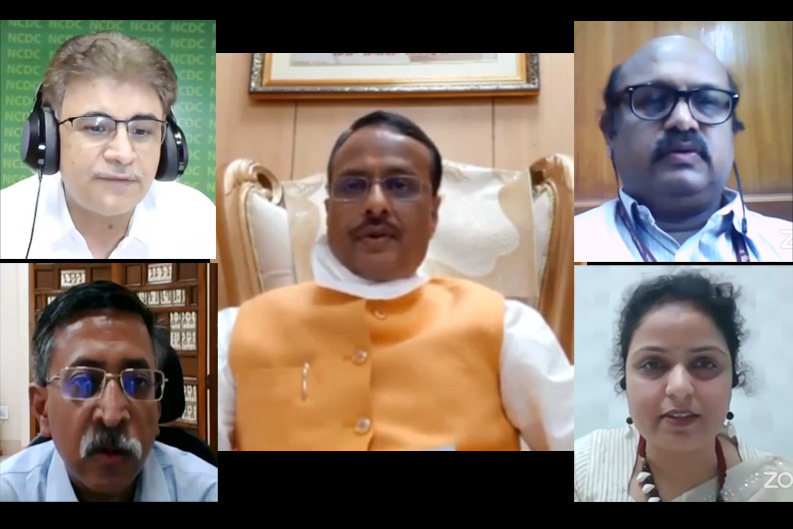The cooperative lender NCDC organized an interactive webinar on ‘Sahakar Suraksha” to discuss ways and means of tackling the locust issue. Scores of experts offered their views and suggestions on how to stop swarms of locusts from attacking crops.
Besides experts, Uttar Pradesh Deputy Chief Minister Dinesh Sharma was supposed to participate in the webinar but could not make it due to the last-minute change in his program. He shared his video address on the occasion.
The idea of organizing the webinar on the locust was designed by NCDC MD Sundeep Nayak. In his introductory remarks Nayak welcomed the participants and said, “Today Indian farmers are facing the issue of locust swarms and there is an urgent need to aware them. On the average, 94 percent of farmers in India are the members of at least one cooperative or the other”, he added.
In his video address, UP Deputy CM Dinesh Sharma said, “Our government has taken several steps to control the locust swarms in the state and keep on creating awareness among the farmers. These locusts have the capacity to destroy the crops. At present, we have deployed teams carrying equipment such as vehicle mounted sprayer, tractor mounted sprayer, fire fighter, drones and others to prevent the spread of locust”, he informed the participants.
“Besides, we have also launched the awareness campaign among the farmers of the state. It is seen that beating thalis (plates), dhols and nagaras can help in driving away locusts from damaging vegetation and crops”, he added.
On the occasion, experts and several representatives of the government shared their views and suggestions.
Ajit Kesari, Principal Secretary Farmers Welfare, the Government of MP said cooperatives can play an important role in controlling the spread of locust swarms. In MP, the locust swarms entered on 17th May and a team of the government of India along with teams from the affected districts, were using water, noise and chemicals as weapons to get rid of the locust”, he added.
“Our team would spray every day at night and around 7k litres of chemical have been sprayed to control the locust attack. We are spraying from fire tenders and extinguishers and asked villagers for the drum beating exercise”, he asserted.
In his keynote address, Dr S K Malhotra, Agriculture Commissioner, GOI said, “Over 94, 800-hectare area in five districts has been affected with the attack of locust swarms. We have released the advisory for spraying the chemical on the crops and undertaken several steps to control them”.
“Cooperative institutions can play an important role in controlling the spread of locust swarms by participating in different training programs and seminars organized by the government. They can also become a trainer. Locusts’ number can increase by 20 times in three months and have the capacity of laying”, he informed the participants.
Meanwhile, S.V.S. Ranga Rao, Registrar, Cooperative Societies, Uttar Pradesh said, “Awareness is being created among the farmers through the medium of co-ops in the state. We are planning to paste banners making the farmers of the attack of locust swarms at procurement centers, PACCs and cooperative banks. We will also engage employees of different co-ops in creating awareness among the farmers”, he added.
Keith Cressman, Locust forecasting expert, FAO Rome also shared his views and said Africa, Yaman and Pakistan are the most affected due to the spread of locusts’ swarms. Farmers can spray bio pesticides, garlic and chili mixture, neem and other measures can help them get rid of the locust swarms.
Keynote speaker Mahlotra answered questions raised by participants on the occasion. Cooperative leader from Nagpur Madhubala Saboo was the moderator.
